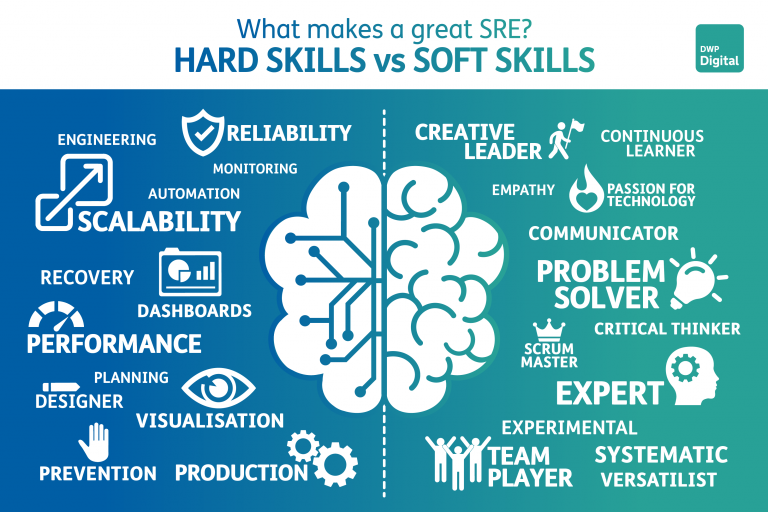SRE vs. DevOps – What’s the Difference?

Ever wondered what distinguishes Site Reliability Engineering (SRE) from DevOps? Stick around, you are about to find out!
The terms ‘DevOps’ and ‘SRE’ are often used interchangeably, with SRE methods and techniques accompanying DevOps culture and practices, though there are several key differences.
The term ‘DevOps’ is short for ‘development and operations’, and it refers to the culture and practices of collaboration between software developers and IT operations professionals. The goal of DevOps is to shorten the software development life cycle and increase the frequency and quality of software releases. ‘SRE’, on the other hand, stands for ‘site reliability engineering’. SRE is a set of practices and principles for achieving operational excellence with cloud-based services.
SRE teams work to ensure that DevOps procedures create quality software and meet operational Service Level Objectives (SLOs).
SREs typically have a background in operations and software development, while DevOps teams can include QA experts, developers, engineers, and SREs.
While both DevOps and SRE are concerned with improving the quality and speed of software development, they are distinct approaches with different goals.

The Purpose of DevOps
In essence, DevOps is the practice of automating software delivery processes in order to speed up development time, remove bugs, and automate system updates. The goal of DevOps is to create a culture that brings developers and ops teams together and puts ops engineers in the driver’s seat.
SRE, or Site Reliability Engineering, is another term that you might hear in relation to DevOps. SRE focuses on finding flaws and inconsistencies in the infrastructure and workflows to guarantee the reliability of services. In other words, SRE is about ensuring quality rather than quantity.
Both DevOps and SRE are important practices for any organization that relies on software to drive their business. By automating software delivery processes and focusing on quality assurance, these practices help to prevent human error and employee burnout. Implementing DevOps and SRE can help your organization run more smoothly and efficiently.
Where did SRE come from?
Service Reliability Engineering (SRE) is a relatively new field that has emerged from the DevOps movement. Like DevOps, SRE is focused on improving the software development process in order to deliver better quality services more quickly. However, SRE takes a slightly different approach than DevOps, with a greater emphasis on reliability and availability. SRE teams are responsible for ensuring that services are always available and running smoothly, which requires close collaboration with other teams such as Operations and Development. In many ways, SRE can be seen as an application of DevOps principles, as both movements are concerned with improving team culture and communication in order to deliver better quality software.

How does SRE assist DevOps?
Site reliability engineering helps organisations reduce operation silos by using the same tools and methods across the stack. In particular, SRE supports DevOps by ensuring gradual change. By helping teams to perform small, frequent updates, SRE reduces the impact of changes on application availability and stability. As a result, organisations can enjoy greater efficiency and flexibility in their operations, as well as improved customer satisfaction.
While DevOps and SRE may both regard errors and failure as inevitable, they approach the issue from different angles. DevOps strives to alleviate runtime errors and allow teams to learn from their mistakes. SRE uses Service Level Commitments to handle all failures. DevOps harnesses the power of tools and automation to prevent errors before they happen. SRE measures and balances out everything to ensure that failures are handled in an orderly fashion. By taking these different approaches, DevOps and SRE provide complementary perspectives on how best to deal with the inevitability of failure.

SRE and DevOps - Adversaries or Allies?
DevOps is a set of practices that emphasise the collaboration and communication of both software developers and other information-technology (IT) professionals while automating the process of software delivery and infrastructure changes. Site Reliability Engineering (SRE) is a discipline that combines software engineering and operations to build, deploy, and maintain scalable systems. While DevOps focuses on culture and processes, SRE focuses on automation. Both DevOps and SRE seek to improve the speed, quality, and reliability of software deployments. They can be viewed as complementary approaches to improving software development.
While DevOps emphasizes collaboration and communication between developers and IT professionals, SRE focuses on automation. This focus on automation allows SREs to identify and fix issues more quickly. In addition, the automation of key tasks frees up time for SREs to focus on more strategic tasks. As a result, DevOps and SRE can be seen as complementary approaches that both aim to improve the speed, quality, and reliability of software deployments. When used together, these two approaches can help organisations break down barriers and improve software at a greater pace.
